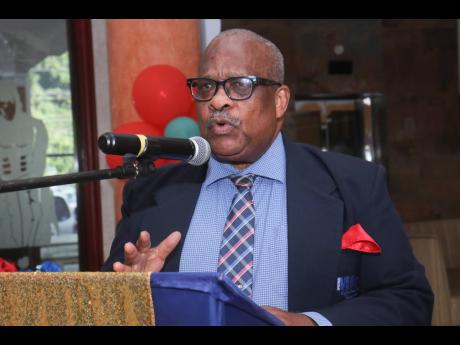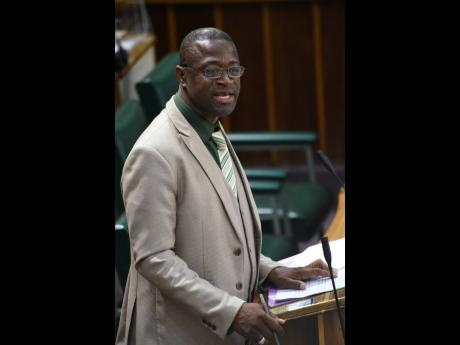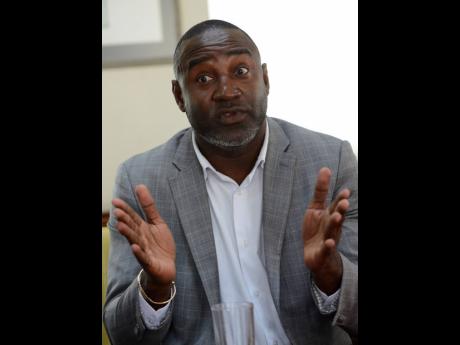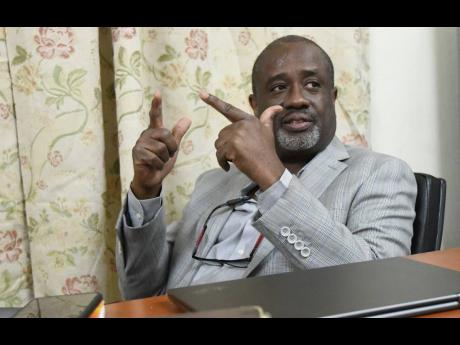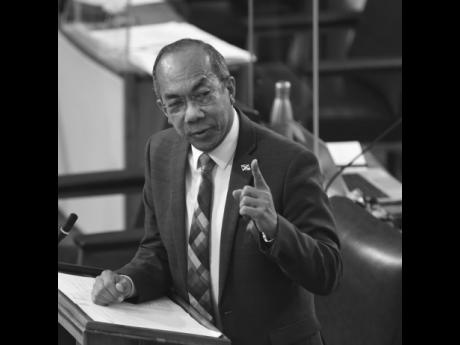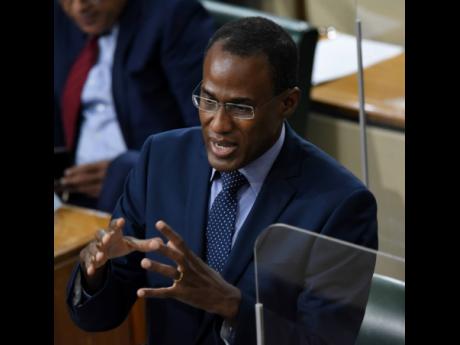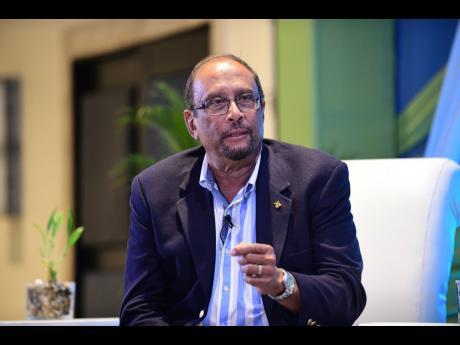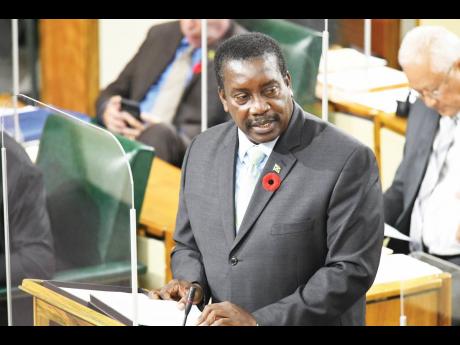Politics: More lows than highs
Distrust and betrayal crippling Jamaica, some analysts believe
Aside from the fall of Jamaica Labour Party (JLP) Cabinet minister Floyd Green for breaches of the Disaster Risk Management Act (DRMA); the arrest and charge of House Speaker Marisa Dalrymple-Philibert for illegal dumping; and the ongoing search to identify the person – some speculated to be Member of Parliament (MP) George Wright – captured on video mercilessly beating a woman, 2021’s political year is described as “flat” by JLP’s general secretary, Dr Horace Chang.
Chang said the expected lull in activities was expected, though the ruling party was still on a “high off the big win in 2020” (49-14) in the general election. The George Wright “issue” was “a distraction”, he said.
Wright ran on the JLP’s ticket in the 2020 election, but after the video emerged, then both he and common-law-wife Taneisha Singh filed separate domestic abuse reports with the police, and all eyes were turned on him. When he took leave from Parliament for an unspecified situation shortly after, he returned to new digs in George William Gordon House – a seat on the Opposition’s benches as an independent MP – having separated from the JLP.
Wright is now an ‘Independent’ member of the House, and neither he nor the JLP has acknowledged any wrongdoing. Unable to identify the persons in the video, and with Wright and Singh no longer pursuing the reports they filed, the police have also closed the domestic abuse matter.
“It was a flat year coming off the political high of 2020. The George Wright issue, in a normal year would have been a big one, but it turned out to be a distraction in a year still dominated by COVID, which has influenced nearly all discussions,” Dr Chang told The Sunday Gleaner.
His next comments suggest early 2022 for local government elections due by February, for which Electoral Office of Jamaica (EOJ) boss Glasspole Brown has requested a $1-billion budget.
“This year is going to be different, I am sure. There were incidents, all of which came down to maintaining credibility, but I think 2020 was the high, you win 49 seats, then you flatten, so let’s see what 2022 will be. If the guys (Opposition) get themselves together and become a political tour de force, and if we do something foolish, then it could spin off on us bad,” Chang said, dismissing the current offering of the People’s National Party (PNP) as viable.
The JLP’s Lower House super majority appears to have negatively impacted the Senate during the year. Too frequent outbreaks of kindergartener tantrums in the Legislature, largely believed to be the cerebral chamber of the Parliament, have left several analysts in disbelief at the Upper House child’s play.
CONFLICTS OF INTEREST, BUT NIGEL CLARKE TOOK BOLD MOVE
Some analysts also believe “conflicts of interest” has come to define the year, in a political system pockmarked by corruption, from which there is no immunity, much like the corona virus.
When the politicians had reluctantly voted yes, but were inherently opposed to efforts to remove politically connected advisers and financial contributors from public boards, it was evident to some that they wanted the status quo to remain, even as Jamaica crawled towards its 60th anniversary of independence.
In a bold move and with little support from even his own side, Finance Minister Dr Nigel Clarke was successful on his third attempt to get passed the Public Bodies Management and Accountability (Nomination, Selection and Appointment to Boards) Regulations in December, in the wake of a slew of controversies involving several public boards. The bill is seeking to cauterise numerous conflicts of interest and misdeeds that have become like gorilla glue on the neck of not only the party, but several agencies of government.
The new rules seek to find persons competent with skills relevant to their respective boards and who will act with integrity, a clear view that Clarke believes boards have not always operated with honour.
Not even Prime Minister Andrew Holness escaped the dragnet of conflict of interest in 2021.
Days after giving full support to Edward Gabbidon, the chairman of the HEART/NSTA Trust board – an entity under the PM’s watch – the agency became embroiled in questionable business transactions and unfair benefits to the chairman’s company. Gabbidon soon after offered his resignation.
HEAVY DISTRUST OF POLITICS AND LEADERSHIP
Howard Mitchell, businessman and former civil society leader who has served at various levels in the governance process, believes Jamaicans have lost the will to fight, which has resulted from betrayal at all levels of the country’s leadership. This, he said, has led to “unprecedented distrust” of the political systems and process.
In an interview with The Sunday Gleaner, Mitchell said political betrayal has left electors largely distanced from the voting process, which has now become “a transactional exchange for elections”.
This distrust is viewed as the main reason for recurring low voter turnout at the polls, and the vaccine hesitancy to fight the pandemic. The end product from this bitter divorce between the people and politics is that the nation agrees on nothing, when consensus is widely needed. In fact, he believes, so great is the distrust deficit that even the most vulnerable are willing to risk their lives rather than take the word of politicians about vaccinations.
Mitchell said throughout history, great leaders have provided direction, painted visions and articulated plans for the greater good by motivating the masses; while others, like many in Jamaica, are nothing more than “sound bite politicians”.
“Jamaica moved from the traditional form of government of the 1960s, after the so-called independence, to a more egalitarian system of government, but quickly abandoned it to go for an authoritarian charisma-driven leadership set-up,” said Mitchell, the former chair of the National Housing Trust (NHT) and the National Health Fund (NHF).
“The problem is you will not get any real development or change until you change the whole system of government, because you will always find that built into our society. We have a system where we tend towards authoritarian, loyalty driven, individual charismatic styles of leadership and government.”
The distrust has widened inequity between the rich and poor, argued Mitchell, but has fattened those close to the trough.
SYSTEM CHANGE NEEDED
Mitchell, who sits on a number of boards and has served as president of the Private Sector Organisation of Jamaica (PSOJ), took the Government to court for the arbitrariness displayed in dipping into the funds of the NHT to provide support for the national Budget.
His views are anchored in the philosophies of German sociologist and political economist Maximilian Karl Emil Weber (1864-1920), who wrote that there were three types of leaders – the bureaucratic, charismatic and traditional leaders – but for Mitchell, Jamaica appears to be a combination of all three, but may be teetering close to the Thomas Hobbes theory.
Hobbes (1588-1679) believed that the only true and correct form of government was the absolute monarchy. In his landmark work Leviathan, he posited that human beings at their core are selfish creatures and must be ruled with the strongest hand possible. In Leviathan, there is no place for discussion, not even for show.
“What is happening with this Government is that the JLP leader Andrew Holness is the dominant leader and is the JLP. The JLP is nothing without him at this time, and that is where the blind loyalty comes from. Where have we seen that before?” asked Mitchell.
“The political system wants this type of pyramid structure where nothing is given away to consensus, transparency and accountability and it’s one man from the head down. The deference, loyalty stifles individual ideas, innovation and encourages corruption and distribution of scarce benefits and spoils,” said Mitchell on Thursday.
He continued, “As long as we have that system it is going to be more of the same. That is the disappointment I have with this particular administration which came in power in 2016. Remember all the great promises and words? And this administration in particular is noted for making promises which are incapable of fulfilment. Until our society and people decide that they are going to take an active role in changing this system, it is as your were.”
Mitchell believes Holness is not anti-intellectual but he is frustrated when holes are pierced into inarticulate ideas with no yardstick for validation. The holes are the result of deep-seated distrust, however well intentioned are the ideas.
With consensus by some analysts that corruption and conflict of interest have come to define the current administration and political process, the belief is that attempts to silence critics have left many Jamaicans “sleepwalking”. It is feared that when the nation eventually awakes from its self-imposed slumber, it may find that it had given permission for all manner of evils without protest.
NOTHING TO CELEBRATE
Former PNP MP and publisher, Lloyd B. Smith, said there was little to celebrate, even as he argued that it was hard to separate the politics from governance, as both influence each other. The only bright spark, he said, was the country’s economy, and he offered credit to the finance minister and Bank of Jamaica Governor Richard Byles for the stability of the sector.
The BOJ is no longer under government control and Clarke stands tallest with policy initiatives.
“If you look in the Parliament, the legislative agenda is not impressive, and one of the standouts, the Road Traffic Act, is becoming a sick joke,” said Smith.
He agreed with Mitchell on the widespread distrust and cited a recent study by researchers at the Northern Caribbean University (NCU), where a high percentage of respondents cited distrust of the Government as their reason for not taking the COVID-19 vaccine.
Smith also raised concerns about the haphazard approach to housing development in the island, aided and abetted by incompetence in the relevant agencies. This will eventually lead to climate change catastrophes, he noted.
Housing solutions for Jamaicans is a major plan of the JLP Government, with Holness calling himself “the builder”.
“I believe politicians have largely lost their moral compass. The George Wright issue still remains a tragicomedy. The impasse between the Leader of Government Business in the Senate (Kamina Johnson Smith) and (Opposition senator) Lambert Brown has played out itself in childishness, and even the Senate President (Tom Tavares-Finson uttering a curse word sotto voce). The conduct of Parliament in 2021 has been disgusting,” Smith argued.
As for the PNP, he said there was no semblance of a unifying structure emerging but admitted it was early days.
Former Prime Minister P.J. Patterson, in a recent interview, urged politicians, parliamentarians especially, to lift their standard of behaviour in both Houses and become role models for the society in their own rights.
THE REAL POLITICAL HEROES
For JLP Chairman Robert Montague, the real political heroes of 2021 were the councillors and caretakers who assisted persons in accessing government care programmes and often spent their own monies to assist the indigent.
“So while at the national level, there may have been a lull, it is not so at the grassroots level,” Montague said.
He said municipal candidates were settled without any disunity, noting that young parliamentarians (19) as well as caretakers and councillors were engaged in an online political education training programme.
Last year, Montague’s transport and mining ministry was placed under the microscope following a Sunday Gleaner expose that entities under the ministry acted questionably.
One made a multimillion-dollar investment of taxpayers’ money without approval, while another was embroiled in controversy arising from a contracts dispute.
PNP TURNING LOW POINTS INTO OPPORTUNITIES FOR GROWTH
The PNP said the resignations en bloc of its four sitting vice-presidents and chairman in July characterised a year which also saw the election of the first woman, Dr Angela Brown Burke, as chairperson.
Its leader, Mark Golding, who was elected in November 2020, appears to be struggling to build a national profile but party insiders say he is being warmly accepted.
PNP’s general secretary, Dr Dayton Campbell, referenced Charles Dickens’ famous line the “best of times…” from A Tale of Two Cities to describe the year. The PNP, like most other organisations, made changes in 2021, he said.
“We were not spared from the challenges that seemingly came as fixed assets, but as we closed the year, we managed to make it a defining one for the party. We have managed to turn our low points and losses into opportunities of growth and a means for welcomed change,” Campbell told The Sunday Gleaner.
“We lost four very able and active vice-presidents and chairman to resignations. Nevertheless, that loss birthed a new slate of vice-presidents and notably, the party’s first female chairperson. Our most defining achievement so far, however, has been watching the Opposition leader and party president, Mark Golding, come into his own as leader and receiving love and admiration nationally as he embarked on islandwide tours. We are again positioning the party as a viable option for government in our country.”
A youth shadow cabinet is also in place, he said.
Campbell was accused by party member Karen Cross of improper behaviour in 2021, but she was in turn called before the disciplinary committee and fined for unsubstantiated allegations.
NATION IN A TROUBLING SLEEP
With the political parties now preparing for local polls due in February, the fourth wave of the pandemic is unlikely to postpone the event, as evidenced by the national polls in September 2020 at the height of the outbreak.
The prime minister’s promise of a Cabinet shake-up early this year has also left several ministers in the line of political fire.
Theologian the Reverend Dr Karl Johnson, rector of the Phillippo Baptist Church in Spanish Town, said the nation is in a troubling sleep.
“It is hard to see anything else except through COVID lenses. The nation is on an economic, mental health, emotional and psychological level and we may not be able to assist it until years down the road. But because of that, there are dangers at different levels,” he explained.
The former general secretary of the Jamaica Council of Churches (JCC) said the focus for the majority of Jamaicans was just “trying to survive”, who may have become forced participants in situations inimical to their own interest.
There appears, Johnson argued, a subtle co-option by Jamaicans of the DRMA for a specific number of attendants at entertainment, church and other social events. To him, there was no empirical data to validate the restricted numbers and that it prevented the transmission of COVID.
According to the clergyman, the Government has distinguished itself as a change agent, but not for good, as a result of the numerous incidents of conflict of interest and corruption that plagued the administration.
“There is a correlation between the low voter turnout and low take-up from vaccination. We have distrust for national symbolism, and we have undermined the important elements of values, moral and ethics and have elevated other models. So what do we think would happen?” argued the churchman, adding that there was also a deficit in both academic and moral education.

